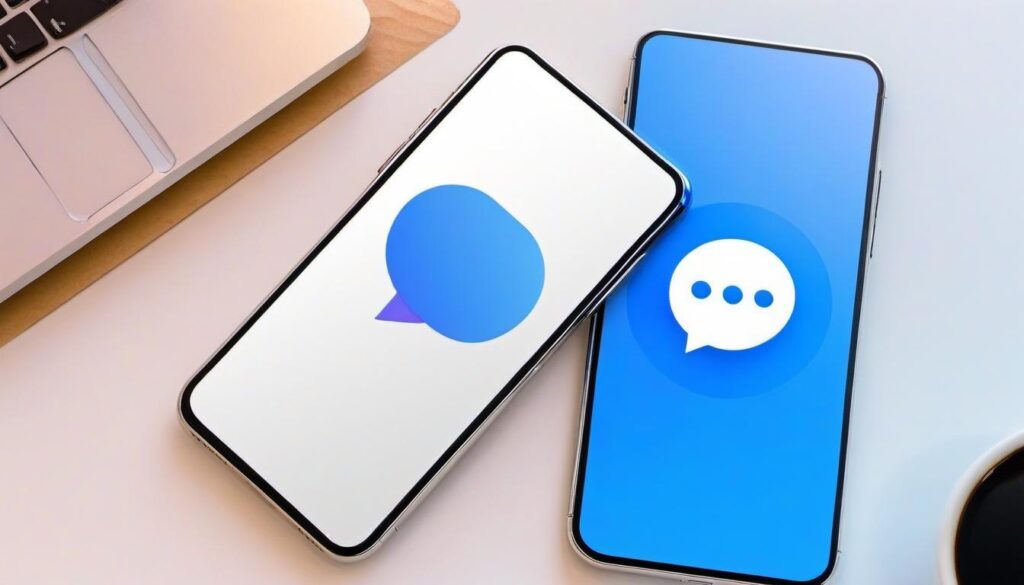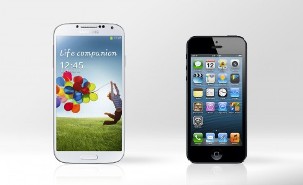
In the realm of Android messaging apps, two prominent competitors continually vie for supremacy: Google Messages and Samsung Messages. Each app brings a unique set of features, interface designs, and performance capabilities that can cater to diverse user preferences. This article aims to provide an in-depth comparison of these two industry titans, analyzing aspects such as user interface, customization options, integration with other services, and overall performance. Whether you’re a dedicated Samsung user or a Google services enthusiast, this comparison will help you decide which messaging app best suits your needs.
Google Messages: Overview
Google Messages is the official SMS and RCS messaging app developed by Google for its Android operating system. It is a robust messaging service that offers a variety of features designed to enhance communication, ranging from basic text messaging to media-rich conversations supported by Rich Communication Services (RCS).
User Interface
The interface of Google Messages is clean and minimalist, aligning with Google’s Material Design principles. Users are greeted with a straightforward layout, featuring a list of conversations, each organized chronologically. The use of white space and a consistent color scheme ensures that the app remains uncluttered and user-friendly. Dark mode is also available for those who prefer an interface that’s easier on the eyes, especially in low-light environments.
Features and Functionality
- RCS Messaging: Google Messages provides support for RCS messaging, allowing users to send high-quality images and videos, see typing indicators, and receive read receipts, which mimics the capabilities found in other famous and amazing messaging apps like WhatsApp and iMessage.
- Smart Reply: Leveraging Google’s AI technology, Smart Reply offers predictive text suggestions based on the context of your conversations, making it quicker to respond.
- Integration with Google Services: The app integrates seamlessly with other Google services, like Google Photos for media sharing and Google Assistant for voice commands.
- Spam Protection: Google Messages includes built-in spam protection, automatically filtering out and notifying users about potential spam messages.
Samsung Messages: Overview
Samsung Messages is the default messaging app on Samsung devices. Developed by Samsung, it is optimized for use within the Samsung ecosystem, providing features and integrations tailored to Samsung’s unique hardware and software capabilities.
User Interface
Samsung Messages boasts a sleek and colorful interface, designed to complement the overall aesthetic of Samsung’s One UI environment. The app offers customization options, allowing users to personalize their chat backgrounds and bubble colors. This flexibility ensures that users can tailor the appearance of their messages to their preferences.
Features and Functionality
- Compatibility with Samsung Devices: Samsung Messages is optimized for Samsung devices, offering unique functionalities such as Advanced Messaging through AT&T or Verizon, which enhances the basic SMS experience with features similar to RCS.
- Customization Options: Users can customize conversations with various themes and settings, making the messaging experience more personalized and engaging.
- Direct Share: This feature allows users to share content directly to their contacts from any app, integrating with the broader Samsung ecosystem, including devices like the Galaxy Watch and Samsung DeX.
- Multimedia Support: The app supports a wide range of multimedia formats, ensuring users can send anything from simple text messages to complex media-rich messages with high-resolution images and videos.
Read Also: Z-Library’s Significant Role in Revolutionizing Digital Reading
Performance and Reliability
Both Google Messages and Samsung Messages offer reliable performance, but they shine under different conditions based on their integrations with their respective ecosystems. Google Messages tends to perform exceptionally well across a variety of Android devices, thanks to its deep integration with the Android operating system. Meanwhile, Samsung Messages is optimized for Samsung devices, providing a smoother and more integrated experience for Samsung users.
Security and Privacy
Regarding security, Google Messages utilizes end-to-end encryption for RCS chats between users who have the feature enabled, ensuring a high level of privacy and security during conversations. Samsung Messages also offers secure communication features, but its end-to-end encryption capabilities are generally leveraged through carrier partnerships and services.
User Experience and Usability
When it comes to user experience and usability, both Google Messages and Samsung Messages excel in different areas, making them suitable for different types of users.
Google Messages:
- Navigational Simplicity: Google Messages offers a straightforward menu layout that makes navigation intuitive even for less tech-savvy users. Important features are easily accessible from the main interface, reducing the need for complicated settings adjustments.
- Search Capabilities: The search functionality in Google Messages is powerful, allowing users to find specific messages, media, and contacts quickly. This is particularly useful for users who have extensive chat histories.
- Cross-Platform Continuity: With Google Messages for Web, users can send and receive messages from their computers by linking their phones. This feature offers great flexibility for individuals who need to manage their communications across multiple devices.
Samsung Messages:
- Device Optimization: Samsung Messages is optimized for the Samsung ecosystem, providing a seamless experience across Samsung devices such as Galaxy smartphones, tablets, and wearables. This tight integration enhances user interaction and convenience.
- Customization and Personalization: With numerous customization options, Samsung Messages allows users to tailor their messaging experience extensively. Features like customizable chat bubbles, themes, and fonts make it highly engaging for users who appreciate personalization in their devices.
- Advanced Features: Samsung Messages includes specialized features like Scheduled Messages and the ability to pin important conversations, which are convenient for managing communications efficiently.
Cross-Platform Compatibility
Cross-platform compatibility is a crucial aspect when choosing a messaging app, particularly for those who use multiple devices or interact with users on different platforms.
Google Messages:
- RCS Universal Profile: Google has been working towards making RCS the global messaging standard. The RCS Universal Profile allows Google Messages to support advanced messaging features across compatible devices and carriers worldwide.
- Web Integration: The Google Messages web client extends the usability of the app beyond the mobile device, allowing users to stay connected through their desktop browsers.
Samsung Messages:
- Carrier-Specific Features: Samsung Messages often works best with specific carriers that support advanced features like RCS messaging. However, availability can vary by region and carrier.
- Limited Cross-Platform Support: Unlike Google Messages, Samsung Messages lacks a universal web client. Samsung users generally need to rely on additional Samsung services or third-party apps for extended cross-platform capabilities.
Voice and Video Messaging
Both Google Messages and Samsung Messages provide robust support for multimedia messaging, including voice and video messaging, making communications richer and more dynamic.
Google Messages:
- Integrated Google Duo: Google Messages integrates seamlessly with Google Duo for high-quality voice and video calls. This integration enhances the communication experience by providing an easy transition from text to video without leaving the app.
- Rich Media Sharing: The app allows users to share high-resolution photos, videos, and audio messages, benefiting from RCS capabilities for better delivery and quality.
Samsung Messages:
- Multimedia Support: Samsung Messages supports a wide variety of multimedia formats, ensuring users can share photos, videos, and audio messages up to a certain size limit, depending on carrier restrictions.
- Voice and Video Features: While Samsung Messages does not integrate directly with a video calling service, it provides seamless access to Samsung’s native video and voice calling features, ensuring high-quality communication.
Integration with Other Services
Integration with other services significantly enhances the utility of a messaging app by allowing users to perform various tasks within the messaging environment.
Google Messages:
- Google Services: As part of the Google ecosystem, Google Messages integrates smoothly with other Google services such as Google Photos, Google Assistant, and Google Calendar. This interconnectivity allows for efficient sharing and task management directly from messaging conversations.
- Third-Party Apps: The app supports link previews and smart replies, utilizing Google’s AI to offer contextual suggestions that enhance user experience.
Samsung Messages:
- Samsung Services: Samsung Messages is designed to work seamlessly with the broader Samsung ecosystem, including Samsung Cloud, Samsung Health, and SmartThings. This enhances the app’s functionality within the Samsung hardware and software environment.
- Device Ecosystem Integration: The app’s tight integration with Samsung devices ensures that features like file sharing and multimedia handling are optimized for performance, making interactions swift and efficient.
Pros and Cons
Google Messages
Pros:
- Intuitive and clean interface
- Advanced RCS features
- Comprehensive Google service integrations
- Cross-platform continuity through the web client
Cons:
- Optimal experience relies on RCS adoption by carriers
- Limited customization options compared to Samsung Messages
Samsung Messages
Pros:
- Extensive customization and personalization features
- Optimized for Samsung devices and services
- Unique features like Scheduled Messages and Direct Share
Cons:
- Best features often tied to specific carriers
Compatibility and Ecosystem Integration
Compatibility and seamless ecosystem integration are significant considerations for users operating within specific brand ecosystems or using multiple devices regularly.
Google Messages:
- Broader Compatibility: Google Messages is compatible with a wide range of Android devices beyond Google’s own hardware. This makes it a versatile choice for users regardless of their smartphone brand.
- Google Ecosystem: The app’s tight integration with Google services, including Google Drive for backup and Google Photos for media sharing, ensures a cohesive experience for users who are already entrenched in the Google ecosystem.
Samsung Messages:
- Samsung-Centric Integration: Designed specifically for Samsung devices, this app offers unique advantages within the Samsung ecosystem. Features like Samsung Cloud synchronization, which backs up message data, and integration with Samsung DeX, enabling desktop-style interactions, are notable examples 3 .
- Enhanced for Samsung Hardware: Specialized functionalities such as S Pen message creation on Note devices and compatibility with Samsung’s wearable platforms, enhance user interactions and make the app a compelling choice for Samsung aficionados.
User Reviews and Feedback
User feedback provides practical insights into the strengths and weaknesses of each app based on real-world experiences.
Google Messages:
- Positive Feedback: Users often praise Google Messages for its clean interface, ease of use, and reliable performance across different devices. The RCS features, especially the ability to send high-quality media and receive read receipts, receive consistent commendation.
- Areas for Improvement: Some users have pointed out the dependence on carrier support for RCS features as a drawback, which can result in inconsistent capabilities across different networks.
Samsung Messages:
- Positive Feedback: Samsung Messages is frequently lauded for its customization options and deep integration with Samsung’s suite of services and devices. Users appreciate the app’s ability to enhance the overall Samsung experience through unique features and hardware-optimized performance.
- Areas for Improvement: Criticisms often revolve around the app’s limited compatibility with non-Samsung devices and the dependency on specific carriers for advanced messaging features.
Which One Should You Choose?
Choosing between Google Messages and Samsung Messages depends largely on your specific needs, preferences, and ecosystem loyalty.
Choose Google Messages If:
- You prefer a clean, minimalist interface.
- You value integration with Google’s suite of services and broad compatibility across different Android devices.
- You need RCS messaging features, especially if your carrier supports them.
- You require the flexibility of managing messages from both your phone and computer through the web client.
Choose Samsung Messages If:
- You are deeply entrenched in the Samsung ecosystem and use multiple Samsung devices.
- You appreciate highly customizable features and personalization options.
- You benefit from Samsung-specific functionalities and services designed to work seamlessly with Samsung hardware.
- You prioritize multimedia messaging capabilities and system-level integrations available on Samsung devices.
Conclusion
Both Google Messages and Samsung Messages offer robust feature sets that cater to different types of users. Google Messages excels in providing a straightforward, clean interface with powerful cross-device support and RCS capabilities, making it suitable for a wider range of Android users who value simplicity and integration with Google services. On the other hand, Samsung Messages stands out with its extensive customization options and deep integration with Samsung devices, offering a tailored experience for users embedded in the Samsung ecosystem.
Ultimately, your choice between “Google Messages vs Samsung Messages” should be guided by your device preference, need for specific features, and the level of integration you seek within a brand’s ecosystem. By considering these factors, you can select the messaging app that will enhance your communication experience and meet your unique needs.


